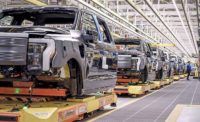STUTTGART, Germany—Daimler AG is developing a sustainable supply chain for its worldwide assembly plants. In particular, the automaker is strengthening enforcement activities that relate to human rights, including the responsible procurement of raw materials. For instance, any type of child labor practice by downstream suppliers is not allowed.
“To prevent violations of human rights effectively at an early stage, [we] have created the necessary tools to do so,” says Renata Brungger, a member of Daimler’s board of management responsible for integrity and legal affairs. “With several tens of thousands of suppliers, and even more subsuppliers, we need to proceed in a risk-oriented manner. Our human rights respect system provides the systematic foundation for this.”
As a globally active automobile manufacturer, Daimler is faced with industry-specific challenges. For instance, the company’s Mercedes-Benz brand deals with 1,500 suppliers. And, its sustainability efforts go beyond direct suppliers.
“We actively create transparency in the supply chain, right down to the mine if necessary,” claims Sabine Angermann, head of purchasing and supplier quality for raw materials and strategy at Mercedes-Benz Cars. “Among other measures, we carry out audits with our teams of experts on site. This applies to materials in battery cells, such as cobalt, but also to classic raw materials such as steel, aluminum or mica.
“Lithium, cobalt and nickel are the main materials needed for the switch to electro mobility,” says Angermann. “The supply chains involve a large number of subsuppliers beyond the primary supply level. [We require our] direct suppliers to vigorously communicate and monitor sustainability standards within the supply chain.
“It is not only the direct supplier that must operate sustainably, but the entire supply chain,” says Angermann.
To monitor the process, Angermann and her colleagues carry out risk-based supply chain walks. Their starting point is the Tier One supplier. Then, the investigation follows critical points in the supply chain, including mines.
Mercedes-Benz is also adopting a plant-level sustainable energy initiative. Starting it 2022, all eight of its German factories will be supplied with CO2-neutral energy. The facilities will completely forego coal-based electricity and obtain electrical energy from only renewable sources, such as solar or wind power.





